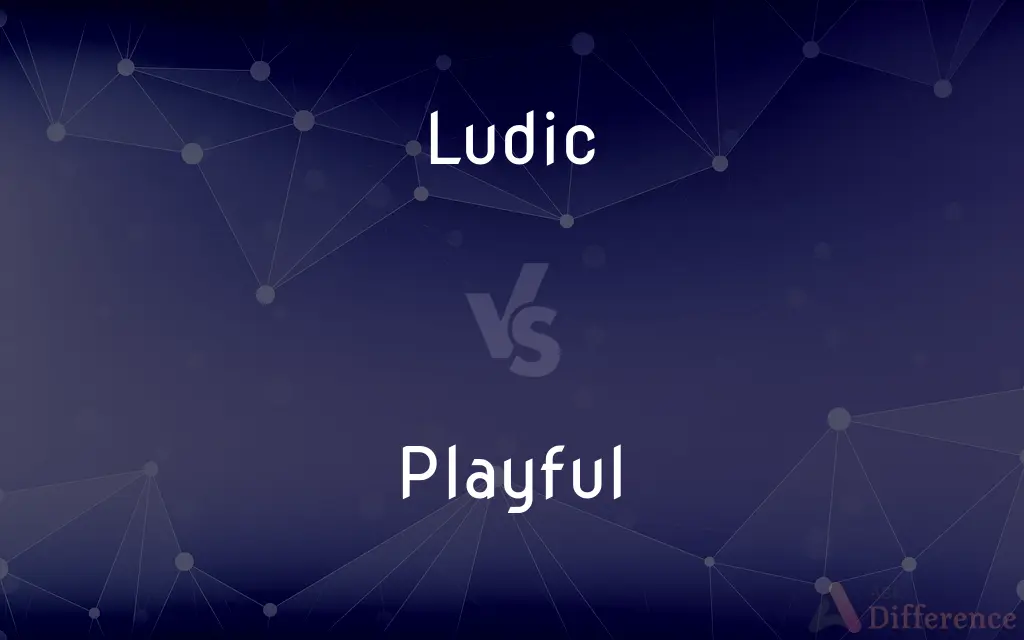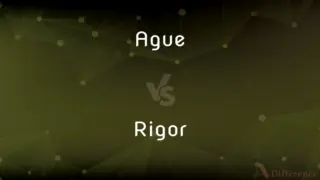Ludic vs. Playful — What's the Difference?
Edited by Tayyaba Rehman — By Fiza Rafique — Updated on May 18, 2024
"Ludic" pertains to playfulness or the quality of being playful, often with a literary or philosophical connotation. "Playful" directly describes someone or something full of play or fun, generally in everyday contexts.

Difference Between Ludic and Playful
Table of Contents
ADVERTISEMENT
Key Differences
"Ludic" refers to activities or behaviors that are play-like or related to play, often used in academic, literary, or philosophical contexts. It describes actions or elements that are intrinsically playful, emphasizing the concept of play itself. "Playful," on the other hand, is a more commonly used term that describes people, animals, or objects that are full of play or fun. It conveys a sense of light-heartedness, fun, and enjoyment in everyday situations.
In literature and philosophy, "ludic" is used to describe works or concepts that explore the nature of play, games, and playful behavior. It often implies a deeper or more structured form of playfulness, such as in narratives that experiment with form and structure. "Playful" is used more broadly to describe any person or situation that is light-hearted, fun, and engaging. This term is commonly applied to children, pets, and casual interactions where the emphasis is on fun and enjoyment.
"Ludic" has a more formal or specialized usage, often found in academic discussions about the role of play in human culture or cognition. It can describe theoretical frameworks or artistic works that incorporate elements of play. "Playful" is more accessible and widely used, suitable for describing everyday interactions and behaviors that are characterized by spontaneity and joy.
Comparison Chart
Definition
Related to play or playful behavior, often in academic or literary contexts
Full of play or fun, light-hearted
Usage Context
Academic, literary, philosophical
Everyday, casual
ADVERTISEMENT
Connotation
Formal, structured
Informal, spontaneous
Common Applications
Describing theories, literary works, artistic concepts
Describing people, animals, interactions
Frequency
Less common, specialized
More common, general use
Compare with Definitions
Ludic
Related to play or playful activities.
The novel's ludic elements challenge traditional narrative forms.
Playful
Exhibiting a sense of humor and fun.
Her playful attitude made her popular among her friends.
Ludic
Denoting a playful style or manner in literature or art.
The ludic nature of the film made it both entertaining and thought-provoking.
Playful
Showing a readiness to engage in play or amusement.
The kitten's playful antics entertained everyone.
Ludic
Pertaining to game-like or playful behavior.
The artist's ludic approach to sculpture invites interaction.
Playful
Engaging in activities for enjoyment and recreation.
The children were playful, running around the park with glee.
Ludic
Associated with the concept of play in a serious or structured analysis.
The ludic qualities of the poem highlight its experimental nature.
Playful
Demonstrating a whimsical or teasing behavior.
He gave her a playful wink across the room.
Ludic
Involving playful, whimsical characteristics in a theoretical context.
The philosopher's ludic theory explores the role of games in society.
Playful
Full of play or fun; light-hearted.
The puppy was incredibly playful, chasing its tail for hours.
Ludic
Of or relating to play or playfulness
"Fiction ... now makes [language] the center of its reflexive concern, and explodes in ludic, parodic, ironic forms" (Ihab Hassan).
Playful
Fond of games and amusement; light-hearted
A playful tomboy who loves to dress up
Ludic
Playful.
Playful
Full of fun and high spirits; frolicsome or sportive
A playful kitten.
Ludic
Of or pertaining to play or games.
Playful
Humorous; jesting
"He meant to be conversationally playful but his voice had no tone" (Saul Bellow).
Playful
Liking play, prone to play frequently, such as a child or kitten; rather sportive.
Actually, we are pretty playful in our romantic life.
Playful
Funny, humorous, jesting, frolicsome.
John is a playful fellow.
A party hat is a playful conical hat people wear at parties.
Playful
Fun, recreational, not serious.
A brainteaser is a playful puzzle posed as a test of intelligence.
Playful
Experimental.
He was a rather playful artist.
Playful
Sportive; gamboling; frolicsome; indulging a sportive fancy; humorous; merry; as, a playful child; a playful writer.
Playful
Full of fun and high spirits;
Playful children sjust let loose from school
Common Curiosities
What is a "ludic" activity?
A "ludic" activity is one that involves play or play-like behavior, often analyzed or discussed in an academic context.
What does "ludic" mean?
"Ludic" refers to anything related to play or playful behavior, often in academic or literary contexts.
Can "ludic" be used to describe a person?
It is rare but possible; usually, it describes concepts, theories, or artistic works related to play.
How is "playful" different from "ludic"?
"Playful" describes someone or something that is full of play or fun in everyday contexts, while "ludic" is more formal and academic.
What contexts are best for using "ludic"?
"Ludic" is best used in academic, literary, or philosophical discussions about the nature and role of play.
Is "ludic" commonly used in everyday language?
No, "ludic" is more specialized and less commonly used in everyday language compared to "playful."
Is "playful" used in academic writing?
"Playful" can be used in academic writing, but it is more common in everyday language.
How would you describe a "ludic" work of art?
A "ludic" work of art incorporates playful elements that engage viewers in a game-like or interactive experience.
What type of behavior is described as "playful"?
Behavior that is fun, light-hearted, and engaging, often characterized by humor and enjoyment.
Is "playful" suitable for formal writing?
"Playful" is less formal and more suited to casual or descriptive writing.
Can a story be both "ludic" and "playful"?
Yes, a story can have elements that are both "ludic" (thematically playful) and "playful" (engaging and fun).
Does "ludic" have any synonyms?
Synonyms include "playful," "game-like," and "whimsical," though they may not capture the full academic nuance.
Can "playful" describe emotions?
Yes, "playful" can describe emotions that are light-hearted, fun, and whimsical.
Can a scholarly article be described as "playful"?
It is unusual but possible if the article adopts a light-hearted or humorous tone.
What is the origin of "ludic"?
"Ludic" comes from the Latin word "ludus," meaning play or game.
Share Your Discovery

Previous Comparison
Ague vs. Rigor
Next Comparison
Participants vs. AttendeeAuthor Spotlight
Written by
Fiza RafiqueFiza Rafique is a skilled content writer at AskDifference.com, where she meticulously refines and enhances written pieces. Drawing from her vast editorial expertise, Fiza ensures clarity, accuracy, and precision in every article. Passionate about language, she continually seeks to elevate the quality of content for readers worldwide.
Edited by
Tayyaba RehmanTayyaba Rehman is a distinguished writer, currently serving as a primary contributor to askdifference.com. As a researcher in semantics and etymology, Tayyaba's passion for the complexity of languages and their distinctions has found a perfect home on the platform. Tayyaba delves into the intricacies of language, distinguishing between commonly confused words and phrases, thereby providing clarity for readers worldwide.
















































